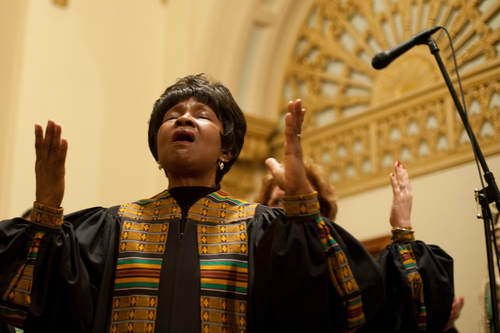The first task of the liturgical musician is to know the meaning and rhythm of our ritual, and then to unwrap it with music that serves the appropriate moments of prayer, with the appropriate spirit.
Music in the liturgy is not applied as an enhancement on top of the ritual. It must be understood as an instrument of agitation or revelation that opens up the experience. It must be a servant of the ritual. Whatever music or song is chosen must be rooted in a fundamental understanding of this need to break open each ritual moment. Liturgical musicians need to be aware of the revelatory nature of their task, and of their role as servants of the ritual prayer.
Let’s examine the spirit of the Gathering Rites and the Liturgy of the Word with a view to the ministry of the liturgical musician.
We often forget that the first act of the community gathered for Mass is to acknowledge the God of creation, and to surrender to the power of God. In the opening rites of the Mass, we stand before the mystery of God, not as individuals, but as a people who give themselves over in faith to the Father of all creation. Our gathering is not merely an act of Christian fellowship; it is an act of worship.
Our gathering song needs to serve as a reminder of the greatness of God, and of our need to offer ourselves humbly in worship. To fully give ourselves over to that spirit of worship, the gathering song needs an extended amount of time. It doesn’t just accompany the opening procession, it brings us together as one voice, united by divine love. Sing a song of praise with five verses, and sing all the verses!
As a continuing act of humility, in the penitential rite we acknowledge our sinfulness and our need for God. We bow our heads, surrender our own sense of accomplishment, success or power, and are assumed into the greatness of God. The word worship is derived from “worthship.” We give ourselves to the God who is worthy of praise. We stand together and remember our smallness in the scheme of things.
It’s not that we are unworthy, it is that God is more and we are less. Whatever musical setting of the “Kyrie” is sung must reflect this spirit. Common sacred silence together is often forgotten during the penitential rite, yet that is a language of the liturgy that speaks far better than any words ever could, especially of our need to be humbled by the vastness of God. Silence is part of our musical response in worship, so, musicians, please remember the community’s need for silent prayer time!
The gathering rites are concluded with the opening prayer or collect, spoken or chanted, that stand to represent the prayers of the whole people of God in union with Christ. Then we sit down and prepare ourselves for the proclamation of God’s Word.
During the Liturgy of the Word, musicians serve the ritual by their offering of the Responsorial Psalm, and in the leadership of the Gospel Acclamation. The psalm, as a response to the first reading, must be prayed and meditated upon by the psalmist in preparation for their service at Mass, so that he offers that portion of the Word of God with understanding and commitment.
Week after week, musicians are called upon to give their skill as an offering in service of the community at worship. The psalm is one of those primary moments and must have the strength of good performance, but in the context of prayer. It is not a “solo” performance; it is ritual prayer and humble service. The Gospel acclamation must be a moment that serves as it is named, acclaiming with energy and strength of belief, the presence of Christ in the Word. The musical settings chosen for the Gospel acclamation and the psalm need to reflect their integral purpose in our worship.
The Universal Prayer is the culmination of the Liturgy of the Word. These intentions need to reflect prayer for the places in our world where darkness dwells, where the light of God’s Word proclaimed on that given Sunday has grown dim. The intercessions and/or the assembly response to each may be sung, particularly in special liturgical seasons. The singing of this prayer gives it a heightened sense of purpose for all the assembly.
Next week’s article will continue these reflections as regards music in the Liturgy of the Eucharist and the Concluding Rites. It is hoped that through reflection on the spirit of our ritual prayer, musicians serving in the liturgy will come to better understand the opportunity and responsibility they have in helping us all renew our ability to worship God.
Start your day with Always Forward, our award-winning e-newsletter. Get this smart, handpicked selection of the day’s top news, analysis and opinion, delivered to your inbox. Sign up absolutely free today!

